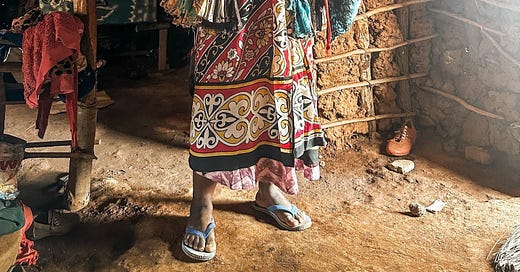Many months ago I intended to share this with you, but I didn’t quite have the words. That happens often—the recorded notes on my phone, the drafts in Substack, and the long-forgotten Google docs prove that sometimes I do indeed start things I cannot finish. What we say, and what I write matters. I tend to dive into what feels complex, certainly provocative, and when it doesn’t feel just right—a highly subjective feeling—I leave it for another time.
It’s a bit selfish, really. I’m afraid of the repercussions of imperfection. I tell myself if I spent more time researching, my words would be ready for the world. But then the days come and go, those precious and fleeting 24 hours that I seem to fill with everything but the due diligence I believe necessary.
Perhaps I need to let go of this perfectionism. Allow the words to flow on the page with less regard for not having all the answers. Clearly, I have a penchant for communicating things many people keep in their heads or share only in tightly-knit circles—like the post below about that time he missed—so why do I only hit send sometimes?
I do not know the answer to this, so for today I’ll throw caution to the wind and share something that deeply touched me over the summer that also leaves me with more questions than answers.
A few months ago, Collete Pichon Battle, an award-winning climate justice advocate, said something on the podcast On Being that I had to listen to repeatedly for it to sink in:
“We’re fighting over whether or not people should have the right to vote? We’re fighting over whether or not people should have the right to their bodies? That is child’s play compared to what this climate crisis is. Where is the righteous indignation on this issue? And why can’t we get past that?”
I thought quite a bit about her question—Where is MY righteous indignation on this issue? I don’t know; it doesn’t exist.
I would argue that for most of us, fighting for the right to vote or for the protection of our bodies and even ending the genocide in Gaza doesn’t require us to give up much materially. We protest, write letters, make phone calls, and ruin dinner parties with little consequence. Life for the most part carries on. To be clear, I’m not suggesting reproductive rights or the freedom of Palestinians or disenfranchising voters doesn’t impact people—it’s the fight for all of those things leave many of us relatively unscathed.
With the climate crisis, however, we’d have to change our daily lives significantly. We would need to examine our comfort and our privilege. The standards we have set for living the “good life” we believe we deserve justify our incredible consumption and our unwillingness to live with less. It’s a harder fight because we have to reconcile our values with our behaviors in ways we don’t with other issues.
The global majority certainly wishes we—read the Western world addicted to fast fashion, driving, Amazon, new phones, and the like—would tap the brakes, but in the name of civility and modernization, it’s always been full speed ahead. And while there is plenty of data proving the onus lies with large corporations and not individuals like you and me, we are going along to get along. It’s not about turning the water off while we brush our teeth or recycling our plastic. It’s that we do not hold corporations accountable and we have yet to meaningfully prioritize climate change politically.
Look at the debate last night—climate change was not mentioned once in the full 90 minutes. It’s 8:49 am and I’m sitting in my home office refreshing Twitter for the latest on the Davis Fire, reading people's posts about ash in their pools and the most expensive homes on the brink of destruction. All of it is an interesting insight into what matters to people and what doesn’t, the conversations we’re ready to have, and the ones we don’t know how to start.
I become viscerally aware of my material possessions while in Kenya, particularly when I visit the homes of the women who take loans from Zawadisha. There is no running water or electricity. They sit on wooden stools or if they have the means (or a loan from Zawadisha), plastic chairs. They cook with charcoal on three stones that can be moved to accommodate the different sizes of sufurias. The rains are unpredictable now, impacting their crops, and people go hungry.
Life is harder for these women and their families because of the current impacts of climate change—not a future “what if.” They cannot escape it the way we do. There are no taps to turn on, thermostats to adjust, or carts to fill with food produced hundreds of miles away. These women don’t have the capacity to be filled with righteous indignation. They need us to be, particularly because our collective behavior is wreaking havoc on the rest of the world, and yet we post photos of cats because that’s easier.
Perhaps I didn’t share Collete Pichon Battle’s words sooner because I do not have an adequate answer to her very valid and pressing question. All I can do is throw my hands up and repeat, It’s all by design. When we are overwhelmed with getting through the day, we ignore the levers being pushed and pulled by those responsible for the climate crisis. We are conditioned to believe we need more, that it all must be bigger and better, more convenient and more efficient. Despite our bottle being full or half empty, we still believe we do not have enough. So why would we give anything up? Why would we shift our activism from what feels so pressing at this moment to something that feels so far away, with an outcome so uncertain?
I share this today not to convert all of you into climate change activists or to shame any of us, but for us to think more deeply about what we care about and why. What are we willing to suffer through and for? It is all connected, after all. There’s no reason not to ask harder questions of ourselves and our leaders, except for the obvious desire: to remain comfortable.
As always, thanks for reading friends.
xxoo,
Jen
PS: I’m facilitating a special offering for all paid subscribers!
When: Thursday, September 26th at 5 pm PST
How: Paid subscribers will receive a Zoom link to join, which will be sent out on the 23rd of September — that means you still have time to subscribe to receive your link!
What: Making Sense of the Enshittification of Everything
Narrowing the wealth gap, ending the exploitative nature of business as usual, and reimagining a new way forward can be quite overwhelming. It’s not something that will happen quickly, nor will it be simple or straightforward. It’s also not something to wait around for, hoping someone else sorts it out—it starts with us. It starts with how we perceive value, success, and wealth. What can we unlearn and how can we evolve our taken-for-granted assumptions about this thing called life? The next step, which I’m practicing every day, sometimes doing better than others, is what we do with those thoughts that are antithetical to everything we’ve been conditioned to believe.
We can do this alone, or we can do this together.
Today I leave you with an invitation to explore this complexity in community. I’d like to facilitate a conversation with those of you who would benefit from a safe space to discuss how you perceive value, success, and wealth, and what collective action we can take. The goal is for you to leave with tangible next steps that support you personally and/or in your business. This offering is for paid subscribers, not because I necessarily expect the compensation (I realize I need to unpack that), but because I believe in reciprocity. It’s a small thing I can do to say thank you for financially supporting me and my newsletter and to add value to your financial decision.











Per usual the solution is to eat the rich.
https://www.pbs.org/newshour/science/this-study-calculated-the-carbon-emissions-of-getting-rich
The personal habits that matter are not tied to recycling or remembering to turn off the lights, but actually just having less money and/or spending that money in less impactful ways. My $0.02 anyway.
Thank you.
Fracking? Really?
Was that just because of being in PA? The state that holds the power to decide for all of us?
ugh.
Thanks, well written...
K